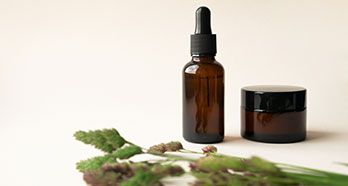Are You Feeding Your Skin? Part 1: Antioxidants
Skin health and achieving healthy skin can mean different things for different people. We are all unique and our skin type will vary from one person to another.
However, the basic structure of our different skin types remains the same and we all need to feed our skin essential nutrients to achieve balance and skin harmony.
The healthy parts of our diet such as eating lots of fruit and vegetables can be replicated as food for the skin. The plant world provides many nutritious oils and extracts that can be incorporated into products that literally feed the skin.
Light plant based facial oils and serums will often contain many potent active ingredients and are rich in antioxidants and essential fatty acids.
In this three part mini skin health series, written for Baldwins by Aromatherapist, Jo Manchester, she talks about the essential nutrients that will help to keep your skin healthy and protected.
Part 1 - What are antioxidants?
Antioxidants are the vitamins that protect our cells from skin ageing free radicals. They act as scavengers that help to neutralise free radicals before they can attach themselves to healthy cells.
Free radicals are unhealthy cells that try to repair themselves by stealing parts from healthy cells. Damaged skin cells play a big part in accelerating the skins natural ageing process.
What causes free radicals to form?
Damaged cells are often as a result of environmental factors such as too much sun exposure, harsh weather and pollution.
Lifestyle choices such as an unhealthy diet, smoking and alcohol can all contribute to the formation of free radicals too.
How can we prevent free radical skin damage?
The condition of your skin is often influenced by what is going on inside your body. This is why it is important to keep your body healthy from the inside out.
Eating a healthy balanced diet high in antioxidant rich foods and low in processed foods and refined sugars will reap many skin rewards.
In fact, including antioxidants in your regular daily diet shouldn’t really be a chore at all.
Berry fruits, particularly blueberries and cranberries are delicious sources of antioxidants. Even dark chocolate and the occasional glass of red wine can be beneficial although moderation is the key.
Adopting a regular targeted skin care routine, rich in plant based nutrients, alongside your healthy balanced diet, will also help to nourish and protect your skin with lots of skin food.
This is where oil based products can come into play.
The skin is oil loving meaning that it will receive oil based products very well. The skins own natural sebum contains a complex blend that includes fatty acids, cholesterol and saturated fats, the degree of which helps to dictate our skin type.
Using light natural plant based oils helps to replenish and balance this natural structure ensuring that your skin is equipped to repair and protect itself.
How to use oils to balance your skin type.
It’s important to use the right oil for your skin type and the plant world provides many different types of oils, all with their own unique fatty acid profile.
Fruit oils such as red raspberry, kiwi, blueberry and pomegranate are good sources of antioxidants that all skin types will benefit from. Rosehip oil is also a great skin rejuvenating ingredient. It’s high in a natural form of vitamin A which is considered an important ingredient for mature and damaged skin.
Normal to oily skin can be balanced with oils like jojoba and safflower blended with fruit oils and extracts. This combination will absorb easily and help to regulate the skins natural sebum production .
Normal to dry skin may need a product that includes slightly fattier oils. Macadamia, Apricot, Rice Bran and Argan oils are all great for this skin type.
Treatment oils formulated to target particularly challenging skin types will often contain a complex blend of ingredients blended to target particular skin concerns.
As well as being rich in antioxidants, plant based oils and extracts are also good for soothing skin irritation, calming redness and inflammation and relieving itchiness often experienced for instance by rosacea sufferers. They help to reinforce the skins natural barrier function and protect from harsh external irritants.
In part 2, Jo will be talking about the natural moisturising factor and why essential fatty acids are important for balancing your skins oil production. Check back next month for more.







 Looking for Qualified Advice on Herbs & Supplements?
Read our health guides, quick tips and popular posts on a range of health conditions, products & fitness
Looking for Qualified Advice on Herbs & Supplements?
Read our health guides, quick tips and popular posts on a range of health conditions, products & fitness
 At number 64, our Walworth Road Shops are featured in Time out London’s
100 best shops and we couldn’t be more delighted!
At number 64, our Walworth Road Shops are featured in Time out London’s
100 best shops and we couldn’t be more delighted!

 View our Catalogue online.
It is stocked full of our latest oils, beauty products, health foods & gifts.
View our Catalogue online.
It is stocked full of our latest oils, beauty products, health foods & gifts.